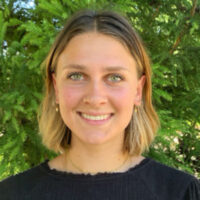By Hannah Baynesan
When Taj-Jahnae Brailsford-Forde first learned the coding language Python during her sophomore year of high school, she never could have imagined the wide range of applications of the skillset. Four years later she found herself using the coding language to calculate energy savings from 1,000 geothermal wells on Princeton’s campus.

“I definitely put my Python skills to work doing calculations. This summer’s work had a pretty significant difference in the magnitude of the datasets,” said Brailsford-Forde.
Brailsford-Forde, a junior studying chemical and biological engineering, was one of 14 students supported by the Andlinger Center for Energy and the Environment to pursue research and virtual internships over the summer of 2020.
She used her computational skills to calculate the maximum thermal energy that could be derived from a 1300-foot geothermal well, as part of a summer internship in Princeton’s CHAOS Lab, led by Forrest Meggers, assistant professor of architecture and the Andlinger Center for Energy and the Environment. Princeton University uses over 1,000 geothermal wells to provide energy to meet the heating and cooling needs of buildings on campus. Geothermal is an efficient and renewable source of energy because it utilizes heat from the earth’s crust to heat and cool water pipes. Brailsford-Forde was tasked with comparing data from the 500-foot standard wells currently used on campus to proposed deeper 1300-foot wells, currently under consideration. Modeling the data, she calculated that by drilling an extra 800 feet and accessing deeper and higher-temperature areas, the clean power project would save the University over $5 million in heating and cooling costs each year.
The researchers provided this data to Princeton University Facilities leadership to demonstrate the value of building the deeper wells, and Brailsford-Forde saw in real time how computer science, computational engineering, and modeling can help answer practical questions, including the value and feasibility of renewable energy projects.
Beyond energy systems research, the Andlinger Center also supported policy research and students. Julia Harisay, a senior in the School of Public and International Affairs, worked at The American Council for an Energy-Efficient Economy (ACEEE), where she adapted an existing U.S.-based behavioral study on real estate market responses to home energy scores for comparable markets in Canada. “Energy scores,” refer to a standard developed by the U.S. Department of Energy to assess energy-related assets in a home to easily compare energy use and costs across the housing market.

Home energy-efficiency information is not usually available on real estate websites, so ACEEE initially conducted a study to test whether the home energy score information, would impact home purchasing decisions in the United States. The 2020 study found that participants who were given home energy-efficiency information were significantly more likely to choose more energy-efficient homes and willing to pay about 6% more for a one-point increase in home energy score than those that did not have access to the home energy information.
Harisay’s role was to adapt that framework and conduct the study for the Canadian market. She first evaluated regional Canadian climates to provide accurate energy scores for homes. She then researched energy costs for different provinces to help develop home energy scores associated with these costs.
The energy scores were then used in a behavioral survey to determine the value of home energy assessments in real estate. The study involved exposing the participants to traditional real estate information, such as square footage and property photos. Then ACEEE provided the experimental group with home energy scores and compared the two to determine how much home buyers valued and considered energy efficiency when buying a home.
The results are still being developed. Harisay said she clearly sees the role of organizations like ACEEE in influencing sectors and markets that may seem surprising or unconventional for an environmental nonprofit. Harisay pointed to energy communications as a key intervention that could positively affect climate outcomes and the environmental footprints of homes all over the world. She also has a better understanding of how nonprofits conduct policy research and also the role of nonprofit organizations in influencing policy and now sees nonprofits as a bridge to fill information gaps between academia and government.
“People working at these non-profit organizations are experts and they are figuring out what needs to be done to reduce emissions, and are directly influencing policy through their studies and communications of the findings,” said Harisay. “It was inspirational.”
Harisay is pursuing a certificate in environmental studies, is co-president of Greening Dining, and is an Ecorep through Princeton’s Office of Sustainability. Brailsford-Forde is on the Sustainability and the Environment track of the chemical and biological engineering major.
The Andlinger Center summer internship program is now offering opportunities for Summer 2021. For more information on opportunities and how to apply, please visit the 2021 internship opportunities page.
The Andlinger Center summer internship program is supported by the Peter B. Lewis Fund for Student Innovation in Energy and the Environment and the Dede T. Bartlett P03 Fund for Student Research in Energy and the Environment.